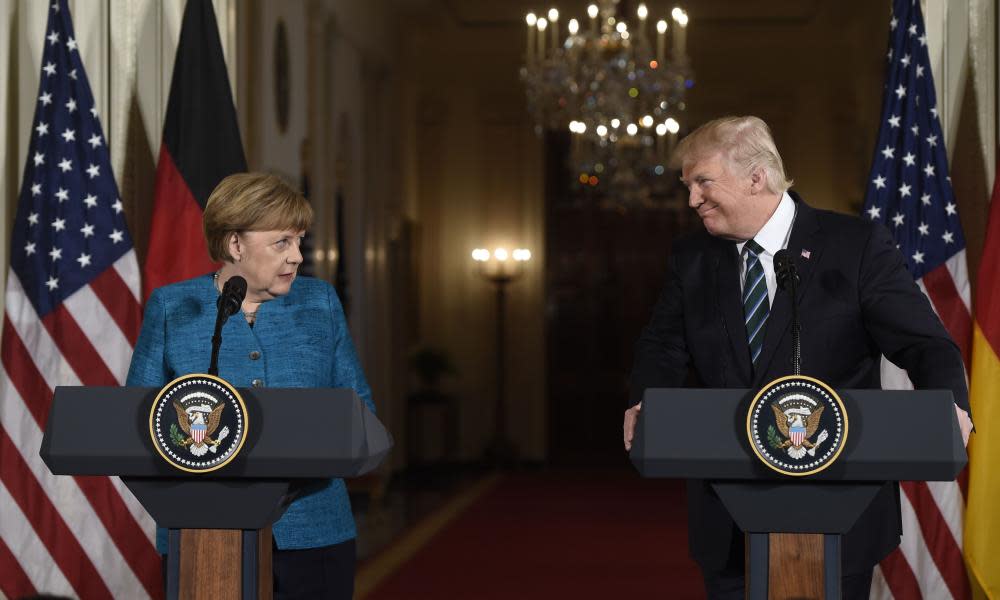Ex-Fox News contributor confirmed as Trump's ambassador to Germany

The US Senate confirmed Richard Grenell, a former United Nations spokesperson and Fox News contributor, as Donald Trump’s ambassador to Germany.
Grenell, whose nomination had been in limbo since last year, was confirmed in a vote of 56 to 42, a day before German chancellor Angela Merkel is due to arrive in Washington for a much-anticipated visit with Trump.
The Berlin post had been vacant for 15 months – the longest such period in postwar German history – amid opposition from Democrats to Grenell’s often controversial remarks on Twitter.
Grenell’s confirmation made him the first openly gay appointee of the Trump administration. He previously served under former UN ambassador John Bolton, who was recently named the president’s national security adviser.
An often polarizing figure, Grenell has a history of sparring with reporters on Twitter and has come under scrutiny for making derogatory comments about prominent women.
In tweets he later deleted, Grenell stated that MSNBC host Rachel Maddow “needs to take a breath and put on a necklace” and suggested former first lady Michelle Obama, a fitness devotee, was “sweating on the East Room carpet”. Grenell also criticized the appearances of Hillary Clinton and Callista Gingrich.
Democrats in the Senate held up Grenell’s nomination for months, criticizing his prior comments as “misogynistic” and “incendiary”. Grenell expressed regret at what he said were attempts at humor gone wrong.
Grenell was an early and vocal supporter of Trump’s campaign, even as other prominent foreign policy figures in the Republican party issued sharp warnings about the former reality TV star’s unpredictable candidacy. He continues to share a personal rapport with Trump and was spotted at the president’s Mar-a-Lago resort over the weekend.
In recent months he has frequently used his Twitter account to comment on German affairs – most recently admonishing the country for not joining American, British and French forces in airstrikes on Syria earlier this month.
French and British forces join the U.S. in striking Syria for a heinous chemical weapons attack on civilians. Germany should have joined this P3 group, too.
— Richard Grenell (@RichardGrenell) April 14, 2018
Hours after a van drove into a crowd of people in Münster on 7 April, Grenell joined speculation that two assailants had fled the scene. It later emerged that the attacker, a German citizen named Jens Alexander Rüther, had carried out the attack on his own, and police criticized those who spread unconfirmed rumors.
Grenell has expressed his admiration for Austria’s young conservative chancellor Sebastian Kurz, describing him as “a real leader in Europe”, and cheered the appointment of the German health minister, Jens Spahn, the leading challenger to Merkel’s liberalising course within the ruling CDU party.
James D Bindenagel, a career diplomat who was charge d’affaires ad interim at the US embassy in Berlin in the mid-1990s, said that Grenell needed to remember that an ambassador was more than just a communicator for the president.
“Ambassadors traditionally have a two-way function: they have to explain America to the Germans, and they have to explain Germany’s position back to the president. I think we can be confident that [Grenell] can communicate Trump’s position to the Germans. The question, can he also do the other half of the job?”
Jan Techau, a senior fellow of the Europe Program at The German Marshall Fund of the United States (GMF), said that the appointment confirmed a wider trend.
“Grenell will be at least the fourth political appointee in a row – a trend that continued under Obama. For me, that’s a sign that the diplomatic value of that post is not worth what it used to.”
While many German politicians view Grenell’s appointment with skepticism, there is also hope that the new arrival could help to establish a transatlantic dialogue that is currently non-existent.
“With Grenell, Germany could at last have someone in its capital who has the president’s ear”, said Metin Hakverdi, a Social Democrat delegate and member of the Bundestag’s American-German parliamentary group. “Given the trouble that German politicians have had gaining some kind of inroad to Trump’s inner circle, that has to be an advantage.”

 Yahoo News
Yahoo News 
